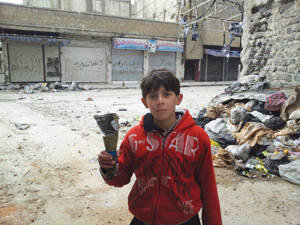Famine and state-building in Somalia, drought and hunger in Africa’s Sahe l region, continuing reconstruction in Haiti and the deteriorating conditions in Syria are at the top of the 2012 priority list for the new Caritas Internationalis secretary general, Michel Roy. These make a full plate for Roy as he nears the end of his first year on the job leading the church’s international umbrella agency for relief and development.
Roy visited New York on Feb. 24, just days after touring conditions in Haiti, and he used the opportunity to meet representatives from U.S. and Canadian Caritas groups, including the Baltimore-based Catholic Relief Services. Roy also managed to squeeze in a visit to the United Nations to speak with officials there about a number of pressing issues including the formation of an international conference aimed at finally resolving the decades-long state of crisis that has been Somalia.
“What we are pushing for,” he said, “is there must be a lasting solution to the situation in Somalia. We can’t just be looking at what is happening and when there is a drought or when there is a special upsurge in the conflict, then we come in” for an emergency response.
Roy said, “We have to get involved in finding a real solution by bringing all actors together around the country to discuss the future of the country and re-establishing a state in Somalia.”
Roy expects that the famine crisis in Somalia will continue to require attention from Caritas through 2012. He added that drought and famine in Africa’s Sahel—a regional belt of semi-arid land on the southern edge of the Sahara Desert, stretching from Senegal to South Sudan—also promises to be a huge concern this year.
Representatives from the U.S. Agency for International Development, the European Union and U.N. agencies met in Rome on Feb. 15 to begin preparing an international humanitarian response to this emerging hunger crisis. “Due to erratic rainfall and failed harvests, high food prices and rising conflict,” wrote U.S.A.I.D. Assistant Administrator Nancy Lindborg in a blog post, “more than seven million people across the Sahel region of western Africa are at risk of plunging into crisis when the lean season begins this spring.” The Famine Early Warning Systems Network is predicting that the most severe food insecurity problem could occur in southern Mauritania in just a few months. Moving into April and summer in the Northern Hemisphere, food insecurity could reach crisis levels in parts of Mali, Burkina Faso, Niger and Chad.
Beyond these persisting famine and hunger issues, Secretary General Roy said conditions in Syria have become an acute concern in Rome. “The bishops are very frightened about what is going to happen to the Christian community if things go on as they are now,” Roy said. “The plea again there is stop violence; let us sit around a table and find a solution.”
Christian communities in Syria, he said, “felt they were at peace with the lay, secular government” of President Bashar al-Assad and protected from religious intolerance by Assad’s now embattled regime. That security may now be in jeopardy. All the same, he thinks, these communities are prepared to deal with Syria’s changing political realities. “They are ready to move forward within another frame of a state,” he said, “but they want to be respected and considered as equal to others in a new country.”








